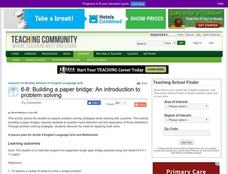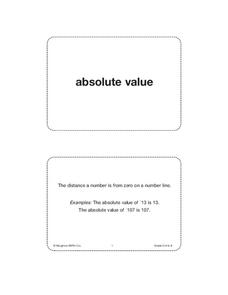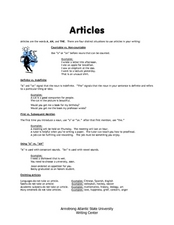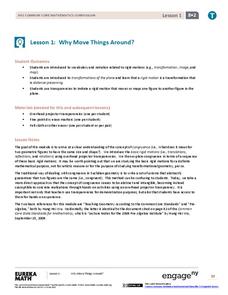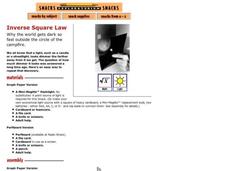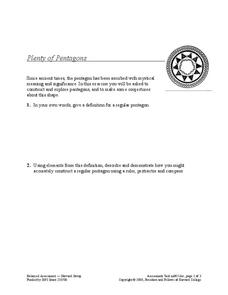Curated OER
Building a Paper Bridge: an Introduction To Problem Solving
Eighth graders explore problem solving strategies to build a paper bridge with a partner. As a class they discuss a variety of techniques to solve a simple problem, then in pairs construct the longest non-supported single span bridge...
EngageNY
Definition of Reflection and Basic Properties
Discover the results of reflecting an image. Learners use transparency paper to manipulate an image using a reflection in this fourth lesson of 18. They finish by reflecting various images across both vertical and horizontal lines.
Houghton Mifflin Harcourt
Unit 8 Math Vocabulary Cards (Grade 5)
Reinforce math vocabulary with a set of flash cards. With a total of forty-eight cards, each are printed in bold font, and include definition cards that offer a labeled example. Terms include absolute value, ordered...
EngageNY
Construct and Apply a Sequence of Rigid Motions
Breaking the rules is one thing, proving it is another! Learners expand on their previous understanding of congruence and apply a mathematical definition to transformations. They perform and identify a sequence of transformations and use...
EngageNY
Definition of Translation and Three Basic Properties
Uncover the properties of translations through this exploratory lesson plan. Learners apply vectors to describe and verify transformations in the second installment of a series of 18. It provides multiple opportunities to practice this...
Laboratory for Atmospheric and Space Physics
Growing Up With A Mission
New Horizons began its journey to Pluto in 2006. Ten years later, it continues its mission. In that time, scholars have surely grown, but how much more will they grow by the time New Horizons reaches its destination? Find out with an...
Balanced Assessment
Catenary
Develop a model for a hanging chain. Pupils find a mathematical model for a hanging chain and then they compare their models to the precise function that models the curve. Scholars come up with a strategy to determine how close...
Curated OER
Application of Delta-Epsilon Definition of the Limit
Students create a Hexaflexagon using a formula. In this calculus instructional activity, students apply the definition of delta epsilon as it relates to limit to create a shape using creases. They relate the same rule to triangles and...
Curated OER
Transformations in the Coordinate Plane
Your learners connect the new concepts of transformations in the coordinate plane to their previous knowledge using the solid vocabulary development in this unit. Like a foreign language, mathematics has its own set of vocabulary terms...
EngageNY
Construct a Perpendicular Bisector
How hard can it be to split something in half? Learners investigate how previously learned concepts from angle bisectors can be used to develop ways to construct perpendicular bisectors. The resource also covers constructing a...
Curated OER
Articles and Article Check-Up
Help your learners practice proper article usage with this informational handout and brief exercise. After reading information about articles and their uses, including details about when to omit articles, scholars complete fourteen...
Curated OER
Mathematics: Technology and Connections
Sixth graders interpret and replicate patterns. In this patterns lesson, 6th graders are given an item with a definite pattern which they must replicate using a calculator or computer and then justify how they relate. Students...
Curated OER
Technical Paper
Learners identify the components of the technical paper. They identify the format of the technical paper and write the title page, a table of contents, an abstract, Works Cited, Bibliography, and Appendix sections of the technical paper.
EngageNY
Experiments with Inscribed Angles
Right angles, acute angles, obtuse angles, central angles, inscribed angles: how many types of angles are there? Learners first investigate definitions of inscribed angles, central angles, and intercepted arcs. The majority of the...
EngageNY
Why Move Things Around?
Explore rigid motion transformations using transparency paper. Learners examine a series of figures and describe the transformations used to create the series. They then use transparency paper to verify their conclusions.
EngageNY
The Decimal Expansion of Some Irrational Numbers
Develop a definition of irrational numbers through an exploration of square roots. The 11th lesson in this series of 25 asks scholars to estimate the value of a square root. Learners observe as the estimation extends further and further...
Granite School District
Vocabulary Cards 1st Grade M-Z
Clarify key math vocabulary terms with this series of printable cards. Three different versions of each term are provided; one with only the word, one with the word and a picture, and one with the word, a picture, and a definition. Note...
Curated OER
Rational and Irrational Numbers 1
You'll need scissors, glue sticks, and mini whiteboards for this activity on rational and irrational numbers. Learners work in groups to classify a variety of expressions as rational or irrational. They are also given a mock discussion...
Exploratorium
Inverse Square Law
The inverse square law is revealed when your class participates in this activity. They move a graph paper or perfboard square back and forth in a square of light to see how the intensity changes. You will definitely want to add this...
Balanced Assessment
Plenty of Pentagons
Why are only four colors needed to color webs from regular pentagons, not five? An assessment task requires young mathematicians to first construct regular pentagons using a compass and straightedge, then has them consider a shape...
Old Dominion University
Introduction to Calculus
This heady calculus text covers the subjects of differential and integral calculus with rigorous detail, culminating in a chapter of physics and engineering applications. A particular emphasis on classic proof meshes with modern graphs,...
Concord Consortium
Function Project
What if a coordinate plane becomes a slope-intercept plane? What does the graph of a linear function look like? Learners explore these questions by graphing the y-intercept of a linear equation as a function of its slope. The result is a...
Illustrative Mathematics
Lines of Symmetry for Quadrilaterals
Explore how lines of symmetry help define different categories of quadrilaterals. Looking at a square, rectangle, trapezoid, and parallelogram, young mathematicians discover that each shape has its own, unique symmetry. Encourage your...
Alabama Learning Exchange
Radians: Just Another Way
Serve up angle measurements on paper plates. Pupils use paper plates and paper-folding techniques to create a unit circle with conversions for special angles. Using their plates, learners explore the relationship between angle...


